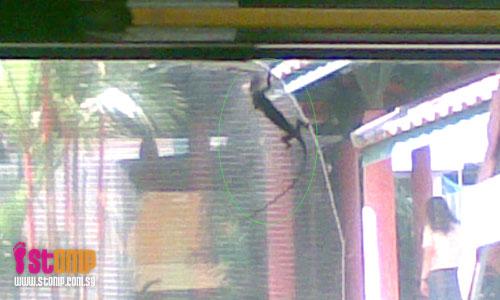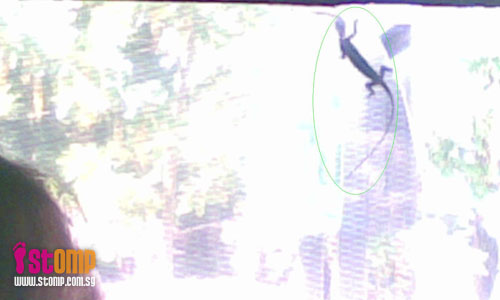
This green tree gecko got a free ride on this bus travelling from Upper Thomson Road to Ang Mo Kio, according to STOMPer Andre, who witnessed its sheer tenacity and determination to cling onto the vehicle.
In an email to STOMP today (May 8), the STOMPer sent in these modified pictures and wrote:
"After a nature visit to Lower Peirce Reservoir located at Upper Thomson Road my girlfriend and I took Bus 169 to Ang Mo Kio for lunch.
"We were really amused with a luminous green tree gecko which was about 25 cm(head to tail) clinging on to the window throughout the journey till it reached Ang Mo Kio bus terminal where we spotted it jumping off about a meter to a low branch.
"We were really impressed by its sheer determination of travelling so dangerously to reach its destination for free. A free ride indeed on Vesak Day."

It's a changeable lizard (Calotes versicolor), not a 'luminous green tree gecko'.
It is very interesting behaviour, and I wonder if this is one way in which an invasive species can quickly spread into new areas.
The changeable lizard is not native to Singapore, and first appeared only in the 1980s, presumably having stowed away on ships and motor vehicles arriving from Thailand or the northern states of Peninsular Malaysia, where this species is native. Having established breeding populations in Singapore, it soon spread throughout the country, and is now found everywhere, even on the smaller offshore islands. Unfortunately, its success has come at the expense of its relative, the green crested lizard (Bronchocela cristatella). Through competition and possibly predation, the changeable lizard has displaced the green crested lizard in much of Singapore.
I wonder if the spread of this introduced species in Singapore was inadvertently facilitated by motor vehicles. It's not as far-fetched as it seems. After all, whether it's grass seeds lodged in tyre treads, or snakes stowed away in cargo, we have unknowingly assisted many species in crossing continents and oceans, enabling them to colonise new areas far beyond their native range.